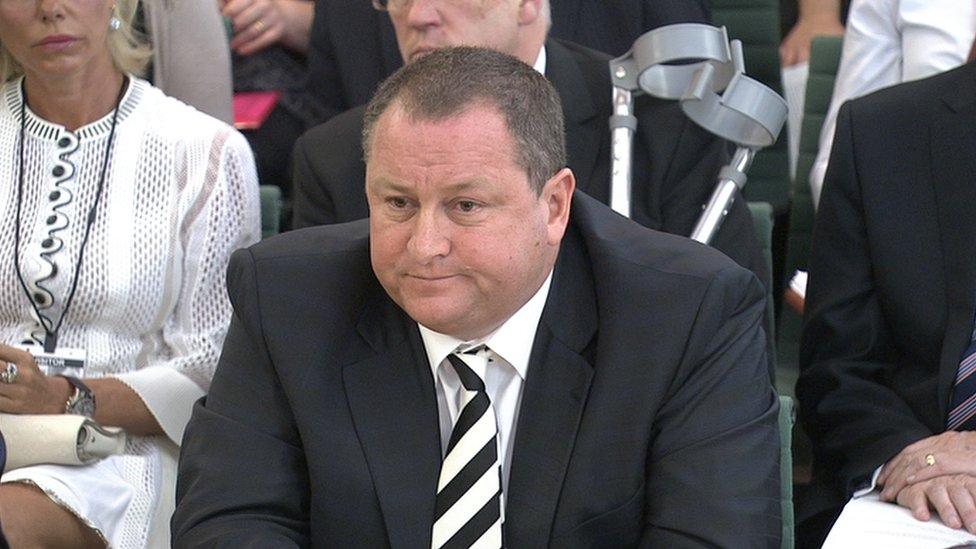'It can't come soon enough': Sports Direct workers react
- Published
Sports Direct staff react to promises to improve their working conditions
Sports Direct has come under mounting pressure to overhaul the way it is run. It follows a report by MPs likening its employment practices to those of a "Victorian workhouse".
On Tuesday the retailer said it will offer directly employed casual retail staff at least 12 guaranteed hours a week, instead of zero-hour contracts.
However almost all staff at the firm's troubled Shirebrook warehouse are agency workers and are not eligible.
Current and former workers at the company have spoken to the BBC about their experiences.
Paul (not his real name) works at a Sports Direct in Manchester and is pleased by the announcement of 12 guaranteed hours a week.
The sooner the changes happen the better. For those of us like myself, guaranteed hours gives better job security and better working conditions which are drastically needed.
I've worked there for two and a half years on a zero hours contract. You work anything from one to six days a week, meaning your pay fluctuates each month. You can turn up one day and be told you are not needed anymore. In the summer they recruit extra staff rather than give the existing staff extra hours.
Mubarak Kolawole worked at Sports Directs between 2008 and 2014

Leaving Sports Direct was the happiest day of my life. I had to work there to get money for college and then later for university.
The new changes sound good on paper but will be exploited. People who managers don't like get shifts nobody wants. When managers want to force someone out who has been there a while they will just continually give them bad shifts.
The working conditions weren't great, with staff being held to ransom by management. You were expected to stay unpaid after the end of your shift to tidy up - sometimes for up to an hour.
If you could not hit enough KPIs (Key Performance Indicators) you could lose your shifts the next week. Many [targets] were unrealistic and unfair.
There was a clear 'lad' culture within the company. Women were given interviews or job offers based on their looks.
Nathan Mordecai works for Sports Direct in Bristol and says he's had a positive experience
I have worked in Sports Direct for almost four years now. I feel like it is a wonderful job and my managers have always given me hours and generally looked after me.
I think what they are talking of is offering, rather than imposing, the 12 hour contract. I'm not sure I'd take it as, being a student, I like the freedom to work when I want . The change is great for people who do it full time.
I've personally never been without hours. I've never had that experience and I've never come across a bad manager in my time there.
I disagree with what happens in Shirebrook however, but feel the media has drastically exaggerated what happens to store staff. Only those staff who hate the job or have been let go for not turning up or turning up late will complain to the media about so-called "mistreatment". It is a wonderful company with great bonus schemes for the store staff, and I love my job.
Mark Pittendrigh is a Sports Direct employee happy with a zero-hours contract
I am a student and a zero-hours contract allows me to work 12 to 16 hours a week during term time, no hours during exam time and 40 hours during summer and Christmas holidays. It couldn't be better for me.

Mike Ashley, the Sports Direct founder at a parliamentary committee
Mike (not his real name) worked at Sports Direct for more than a decade
These negative reports really bore me. I started as a zero hour employee and worked my way up to store manager. The company has grown into the UK's biggest sporting retailer.
Why don't the media ever report the positive aspects of the business? Mike Ashley has never made himself out to be a perfect leader. It's far from perfect, but Sports Direct won't be taken out by a media or government witch hunt.
Andrew (not his real name) worked at several stores in London for five years
It is true that the zero-hours contract gave me flexibility, which was very useful for me as a student - but it also caused a lot of uncertainty. The rota almost never used to be done until late on Sunday night. Many of the staff, who had a day off on Sunday, would have to call in to find out whether they were supposed to work the next day.
Also, the zero-hours contract has often been used by the store managements as a stick to beat the staff into performing better. For example, if you do not manage to sell the products listed as KPIs (key performance indicators) as expected, chances are your hours will vanish from the rota.
The management can, on one hand, decide your rota and let you go home with short or no notice. The staff, on the other hand, need to be in the premises 15 minutes earlier than their shift starts and an inability to do so can lead to cutting of hours. This, in my view, is deeply hypocritical.